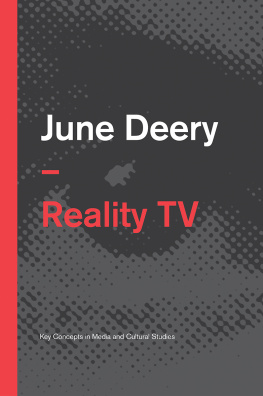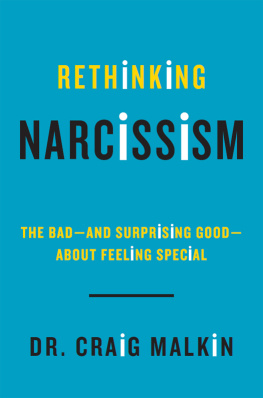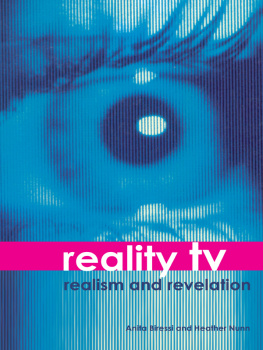The New Narcissus in the Age of Reality Television
This book explores the emergence and encouragement of the new narcissus in our society and the ways in which this is portrayed in reality television. Through studies of well-known reality shows, including Toddlers and Tiaras, Hoarders, Sister Wives, Catfish: The TV Show, Celebrity Rehab with Dr. Drew and The Real Housewives, the author examines the combined effects of narcissism and consumerism, shedding light on the ways in which people are pushed to focus on their own biographies and self-promotion to the point of creating a false self within the individual and the development of a sense of dissatisfaction, dis-ease and unhappiness.
Applying Freuds concept of narcissism and tracing it through the work of key social theorists including Durkheim, Lasch, Goffman, Riesman, Baudrillard and Giddens, The New Narcissus in the Age of Reality Television constitutes an insightful analysis of the modern ideology of greatness, perfection or being the best, that permeates society an ideology that overwhelms and ultimately drives the individual to dissemble and project an artificial self. A compelling argument for the importance of understanding the persistence of a powerful and dangerous trait in modern society, this book will appeal to scholars of sociology, social theory and cultural and media studies with interests in reality television, celebrity culture and modern narcissism.
Megan Collins is Assistant Professor of Sociology at Prairie View A&M University, USA.
Classical and Contemporary Social Theory
Series Editor:
Stjepan G. Mestrovic, Texas A&M University, USA
Classical and Contemporary Social Theory publishes rigorous scholarly work that re-discovers the relevance of social theory for contemporary times, demonstrating the enduring importance of theory for modern social issues. The series covers social theory in a broad sense, inviting contributions on both classical and modern theory, thus encompassing sociology, without being confined to a single discipline. As such, work from across the social sciences is welcome, provided that volumes address the social context of particular issues, subjects, or figures and offer new understandings of social reality and the contribution of a theorist or school to our understanding of it.
The series considers significant new appraisals of established thinkers or schools, comparative works or contributions that discuss a particular social issue or phenomenon in relation to the work of specific theorists or theoretical approaches. Contributions are welcome that assess broad strands of thought within certain schools or across the work of a number of thinkers, but always with an eye toward contributing to contemporary understandings of social issues and contexts.
For a full list of titles in this series, please visit: https://www.routledge.com/sociology/series/ASHSER1383
We Count, We Matter
Voice, Choice and the Death of Distance
Christopher Steed
Depressive Love
A Social Pathology
Emma Engdahl
The New Narcissus in the Age of Reality Television
Megan Collins
Existence, Meaning, Excellence
Aristotelian Reflections on the Meaning of Life
Andreas Bielskis
The New Narcissus in the Age of Reality Television
Megan Collins

First published 2018
by Routledge
2 Park Square, Milton Park, Abingdon, Oxon OX14 4RN
and by Routledge
711 Third Avenue, New York, NY 10017
Routledge is an imprint of the Taylor & Francis Group, an informa business
2018 Megan Collins
The right of Megan Collins to be identified as author of this work has been asserted by her in accordance with sections 77 and 78 of the Copyright, Designs and Patents Act 1988.
All rights reserved. No part of this book may be reprinted or reproduced or utilized in any form or by any electronic, mechanical, or other means, now known or hereafter invented, including photocopying and recording, or in any information storage or retrieval system, without permission in writing from the publishers.
Trademark notice: Product or corporate names may be trademarks or registered trademarks, and are used only for identification and explanation without intent to infringe.
British Library Cataloguing in Publication Data
A catalogue record for this book is available from the British Library
Library of Congress Cataloging in Publication Data
Names: Collins, Megan, author.
Title: The new narcissus in the age of reality television / Megan Collins.
Description: 1 Edition. | New York : Routledge, 2017. | Series: Classical and contemporary social theory | Includes bibliographical references and index.
Identifiers: LCCN 2017026399 | ISBN 9781138206977 (hbk) | ISBN 9781315463490 (ebk)
Subjects: LCSH: Narcissism. | Self. | Consumption (Economics) | Reality television programs--Social aspects. | Lifestyles.
Classification: LCC BF575.N35 C65 2017 | DDC 155.2/32--dc23
LC record available at https://lccn.loc.gov/2017026399
ISBN: 978-1-138-20697-7 (hbk)
ISBN: 978-1-315-46349-0 (ebk)
In this discerning study, Professor Megan Collins makes a significant scholarly contribution to both the theoretical understanding of the concept of narcissism, and reality television. Her conjunction of these two phenomena is significant because the prevailing views of both are pitifully shallow. The existing literature regards narcissism as a private problem afflicting a small percentage of individuals. Collins goes beyond the dutiful citations of Freud in discussions of narcissism, which fail to account for the social and cultural dynamics of narcissism. Even psychiatrist Christopher Laschs often-cited Culture of Narcissism, while using the word culture, fails to go beyond the atomistic model of such culture as a collection of individual narcissists. As for the vast literature on reality television and media in general, Collins is not content with the prevailing assumptions that reality television is merely a cultural expression of authenticity, interest in ordinary people, connectedness, and other truisms. She demonstrates convincingly that the reality shows she chooses for analysis are replete with classic symptoms of narcissism: hoarding, perfectionism, selfishness, deceit, fake emotions, manipulation, and chronic boredom.
To achieve this link between narcissism and reality television, Collins moves beyond Freud to include Emile Durkheim on the classical end of social theory, and beyond Lasch to include David Riesman, Todd Gitlin, Sam Vaknin and Jean Baudrillard on the more contemporary end of social theory. She is correct to say that that Durkheims concept of anomie includes the infinity of desires that is so similar to the insatiability of narcissists. But sociologists have neglected Durkheims characterization of the bottomless abyss of desires as a symptom of anomie in favor of the meaningless and incorrect understanding of anomie as normlessness. Durkheim never used the word normlessness or any concept similar to it. And his overall point is that the desire for infinity becomes the norm in anomic societies, and is caused by society, not by individuals. Modern economies depend upon the assumption that there is no end or satiation point for the consumption of goods, fame, experiences, or achievement. In contemporary parlance, narcissism becomes the new normal in dysfunctional, anomic societies. Similarly, Veblens well-known concepts of









